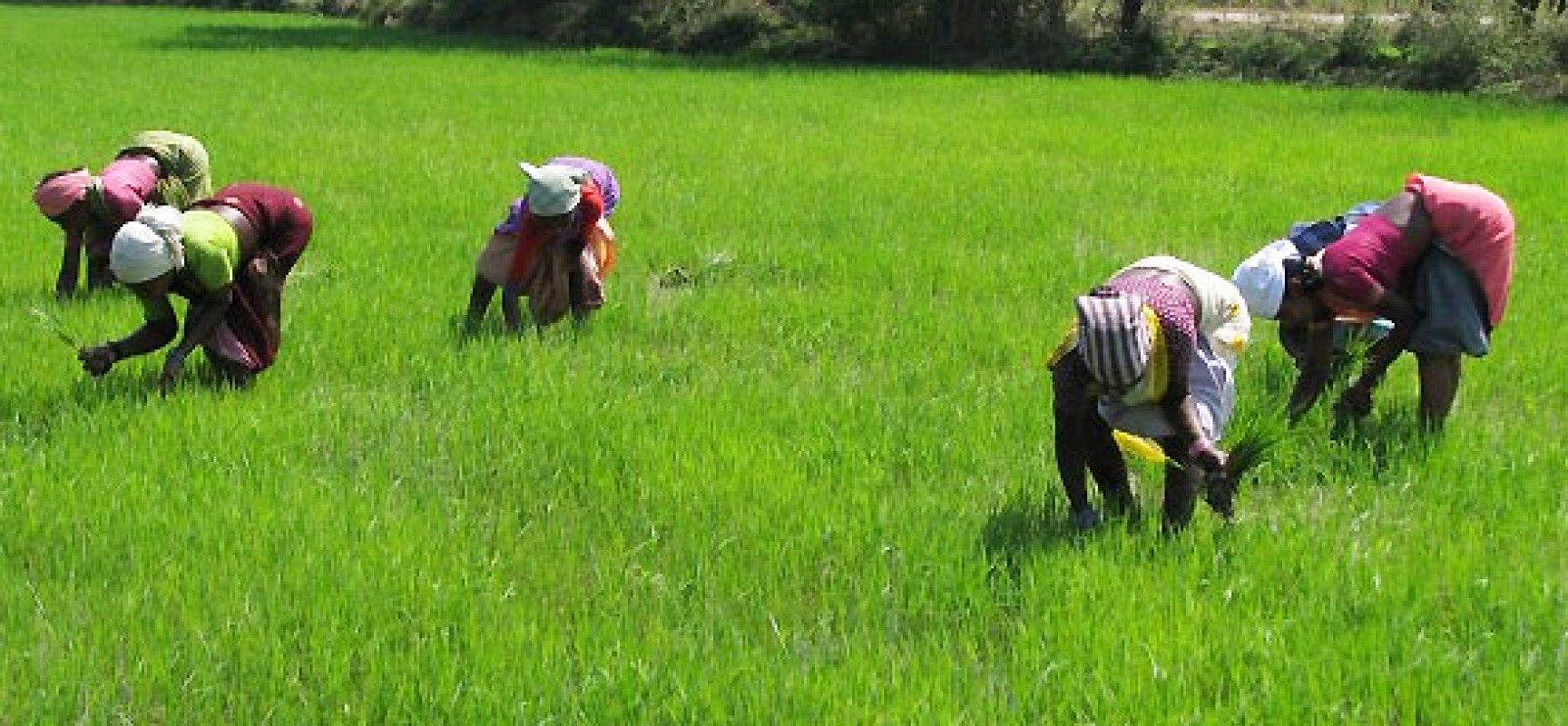Tag: Farming
-
Situating Nigeria’s agric potential – Mariam Mohammed
Recently, the Speaker of the House of Reps, Yakubu Dogara, caused a buzz when he was shown visiting his expansive farm showcasing diverse crops including animal husbandry. The import of that media blitz of the Speaker’s is that the elite clearly understands that agriculture holds the key to sustainable development.Before Dogara’s, we are witnesses to President Muhammadu Buhari showcasing his herd of cattle most times when he is in his hometown of Daura. The cheering news about this is that it is not just the elite that are given to the idea of investing in agriculture. We have entertainers like music star, D’Banj, who has commercialized his farm produce with the popular Koko garri, actress Halima Abubakar, veteran actor Yinka Quadri, the ‘jaga-jaga’ crooner, Eedris Abdulkareem, film producer and actor, Taiwo Hassan amongst a host of others.In an interview not too long ago, D’Banj was quoted as saying: “I engage in agriculture personally to encourage millions of African youths who look up to me as a role model. I need to let them know that unlike the old stereotype of farming which was considered as a form of punishment, modern farming on the contrary, is a cool source of employment for many graduates. Agriculture is life and it is everything that we live for. It is the only way forward for us in Africa. There are so many potentials in it and if we could focus on it, the continent can actually feed the rest of the world.”Nothing can be farther from the truth that the value chain in agriculture is immense if properly harnessed.Let’s take the case of former journalist Rotimi Williams who is reputed to own the second largest commercial farm rice in the country. Williams, 35, has a farm that measures 45, 000 hectares in Nasarawa state and employs more than 600 indigenes of the state without counting the spiral effect of the job creation and investment in the area and beyond.As a country that consumes more than 5 million metric tons of rice every year, with a significant portion from imports, people like Williams are exemplars that with the right policy by government, the country’s quest for self-sufficiency is possible after all.It is in this regard that the Federal Government’s Anchor Borrowers Programme powered by the Central Bank is a vital instrument. The significant aspect of the intervention, which I find compelling, is seeing agriculture as a business driven venture and not simply as a subsistence endeavour.Therefore, taking the route of business-driven agriculture to the grassroots through the Nigeria Incentive-Based Risk Sharing System for Agricultural Lending (NIRSAL), by deploying an innovative nation-wide field structure to support 225,000 farmers should be applauded.Under the Project Monitoring Reporting and Remediation Office (PMRO) with units located in each state and the federal capital, the NIRSAL is realizing its core mandate of making agriculture more attractive for private sector investment by de-risking the agricultural value chain.Speaking not too long ago on the importance of the PMRO, Managing Director/CEO of NIRSAL, Aliyu Abdulhameed, explained, “The PMRO structure is very critical to our operations. Agriculture is a field business. They would act as our eyes to ensure that agricultural projects that we facilitate finance for are executed in line with agreed terms and also serve to extend the reach of our interventions.”Despite all of these, they are people who think that it is still a long road to Uhuru, and rightly so. In a country that even productive ventures are seen as tools for political patronage, there is the urgency by these agencies to demonstrate that they are insulated from the vagaries of politics and the shenanigans of politicians.Besides this, policy inconsistency is a major drawback. We have seen government rolling back programmes only to reintroduce them either under a new nomenclature or with slight modifications. In a situation where farmers and investors are unsure of the policy of government for a sector that requires medium and long term planning, then there is little hope of getting the right people to show genuine interest and commitment.While most Nigerians think this government has done well in boosting agricultural entrepreneurship, the new worry centres round President Muhammadu Buhari’s recent visit to President Donald Trump of the United States.On many strategic fronts, the visit is a plus and reinforces the vital nature of Nigeria in global affairs, the nagging doubt of what type of agreement was entered into by the president persists.It is a given that with myriads of security challenges, the country needs the security might of the U.S in tackling the threats of Boko Haram and other existentialist groups but are we counting the cost when there are other alternatives to our common good? In the global agricultural and trade war, countries like Nigeria become pawns in the hands of the major players, therefore, a lot of tact and guile is required if we are to protect our local markets and investors.Without a doubt, the U.S. and China are in a bitter trade war with agricultural produce at the centre of it. It is known that owing to some Trump’s business decisions on Chinese businesses that China is enforcing new tax policies on American agricultural products and to absorb the outcome of the enforcements, President Trump is looking to countries like Nigeria, Argentina and Brazil as buffers.So to sign a deal that will see U.S. agric produce, which by the way are heavily subsidized, flooding the Nigerian market at a time that America is not buying our crude is to adversely undermine the potential of the efforts of government to not only ensure food security, grow our economy and job creation, but to seriously eat into our forex market.What government needs to do is to create a buffer of tax exemptions for farmers and other incentives to keep our farmers afloat while seriously tackling the menace of armed banditry and insurgency on farming communities, as well as properly ensure that all imported produce pay the correct tariffs and duties. -

Cossy dumps acting for farming?
Boobs-toting Nollywood diva and singer, Cossy Orjiakor may have dumped acting for farming. The busty role interpreter and singer has said she has ventured into farming.
Cossy noted that she spends time in her farm more than anything else.
“ I am a farmer now and there is no going back. I have acquired several acres of land and currently tilling and weeding to cultivate anything cultivatable including yams, cassava, Vegetable and more. Film making does not stop me from farming the land because I know that man must wack”, she told Vanguard.
Cossy has joined the likes of D’banj, Yinka Quadri, Taiwo Hassan, Halima Abubakar who have ventured into farming.
D’banj in an interview revealed how he caught the farming bug. Hear him:” They told me about how if we focus on agriculture in the next five, six, seven, 10 years, Africa can actually be feeding the rest of the world. They told me about how much the small scale farmers don’t even have any support and they are the larger percentage of people that are giving us what to eat.Agriculture is actually everything that we live; food is life; agriculture is life.”
Trouble looms as Cynthia Morgan evades tax, owes house rent
-
Cross River Basin introduces Songhai model farming in Mbiabo Ikoneto Community
The Cross River Basin Development Authority, says it has introduced the Songhai Agriculture Model in Mbiabo Ikoneto Community to encourage farmers to take up farming as a major income earner.
The Managing Director of the authority, Mr Bassey Nkposong, said this in a statement issued in Abuja on Wednesday.
According to him, the partnership, in liaison with local farmers, youths and women in the community is expected to reduce unemployment, poverty and promote food security.
The Songhai Model of Agriculture, practiced in Porto Novo, Benin Republic, has the capacity to create highest level of agricultural productivity through the use of natural resources for optimum benefit.
Nkposong said the Federal Government was ready to change the mindset of the future generation toward a conscious appreciation of agriculture as a way out of the nation’s economic problems.
He said the authority was not buying the land from the community, but was partnering with them with a view to adding value and improving on the productivity of the farms.
According to the managing director, when the formal Memorandum of Understand (MoU) is signed, the terms of engagement will be spelt out for the smooth take-off of the project.
He also appreciated the community for accepting to host the Authority.
Responding, the Clan Head of the community, Chief Etubom Ani, said the present economic realities in the country had opened the eyes of most Nigerians to see agriculture as the way to go in the country’s quest for food security.
He pledged the community’s commitment to the Federal Government’s Agricultural Transformation Programme, saying it was the panacea to Nigeria’s economic difficulties.
Nkposong said his community was ready to take advantage of the programme by providing and developing the needed land.
He commended the authority for choosing to do business with the community.
Ani called for the inclusion of women and youths in the proposed scheme, which he said could assist in banishing poverty and unemployment in the area.
“My community would not only support the Authority but would equally ensure that a conducive working environment is created for the smooth operation of the scheme,’’ he said.
The Federal Government had in 2016 signed an MoU with Songhai Farms, Porto-Novo, Benin Republic to harness and exploit the resources of River Basin Development Authorities across the country.
-

114 youths to get 600 hectares for farming in Ekiti
No fewer than 114 youths are to get about 600 Hectares for crop farming in Ekiti State under the Agriculture Service Provider Programme.
The initiative is a collaboration between the State Government and the Agro Nigerian Ventures Limited in Ado Ekiti.
Under the ASPP, at least five graduates from each of the 16 Local Governments in the state had been trained in farming, especially crops.
Speaking in Ado Ekiti, the Chairman of ANVL, Mathew Ajayi Aderiye, said the collaboration would improve food security in the nation and reduce unemployment among youths.
“We have just trained the 114 youths at the Federal Polytechnic, Ado Ekiti. The programme has changed the thinking of these trainees towards farming.
They have signed a Memorandum of Understanding with crops association that wants to make use of their services once they get their power tiller machine.
“They have also signed an agreement with off takers – companies that want to buy their products at harvest – especially maize.
“A company has approached us for 800,000 tonnes of maize and they are looking for people to plant them.
They offered the youths to plant two hectares of maize for them. The company will supply the seedlings; so Ekiti would soon become the food basket of the nation.”
Aderiye appealed to the government to give more priorities to farming because Nigeria is blessed with good climate and potential to be among the world best food producers